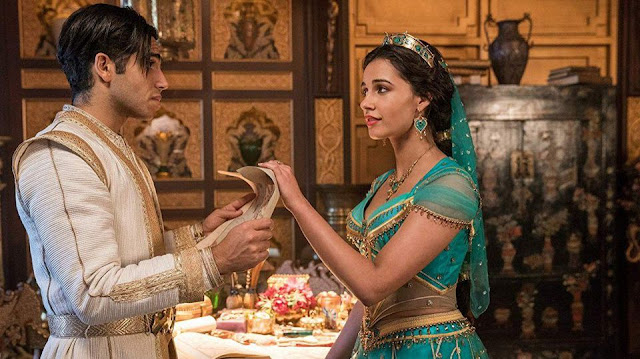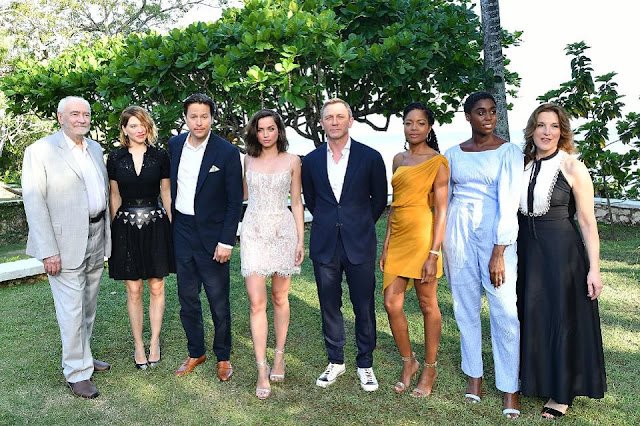Aladdin succeeded because it's a musical
Aladdin's form as a musical-fantasy is the sole reason why it broke out at the box office compared to Disney's recent live-action flicks
 |
| Naomi Scott in 'Aladdin' (CREDIT: Disney) |
by Jack Linsdell
As of this weekend, Guy Ritchie's Aladdin remake (see my review here) for Disney has continued to break big at the worldwide box office, taking in $500 million worldwide and $207 million domestically (becoming already the second-highest grossing musical in North America) so far, bucking a recent trend of Disney's so-called live-action adaptions underperforming/failing in terms of budgets or expectations commercially. Into that bracket we've had The Nutcracker and the Four Realms, Marc Forster's severely underrated Christopher Robin and Rob Marshall's Mary Poppins Returns come most obviously to mind. The Nutcracker and the Four Realms grossed $173 million on a $120 million-budget, Christopher Robin did slightly better with $197 million on a $75 budget and Marry Poppins Returns was even more profitable with $349 million worldwide on a $130 million budget. So, why has Guy Ritchie's Aladdin remake bucked the trend and is looking to end with an above/below $700 million total worldwide?
There's been a lot of talk by critics/bloggers/film pundits in that the main answer behind this question lies in an keen audience investment in the IP of Aladdin due to nostalgic fondness of the 1992 original, compared to the relative lack of interest in a sequel to Mary Poppins, a kid-friendly adaption of how Winnie the Pooh came to life or an imagining of the Nutcracker story. I agree that this could have had a contribution to the film's success, however I would also argue that in particular to Mary Poppins Returns there is the same amount of nostalgic/generational love for the original Mary Poppins (especially in key markets like the United Kingdom). But, Will Smith's starring-turn as the Genie was a contributing factor due to him being one of the only true "butts in seats" movie stars of our modern era whose name above the title on the poster can actually be enough to draw audiences into cinemas - Dwayne 'The Rock' Johnson is the only other one. Added to that, Aladdin's majority ethnic minority cast made it a demographic-specific event movie for audiences who are unused to seeing those that look like themselves representing them on screen. These were all equally impactful on Aladdin's commercial over-performance in comparison to Disney's recent live-action adaptions.
However, let's also note the tone/content as a major factor. The Nutcracker and the Four Realms, Mary Poppins Returns and Christopher Robin were all largely more emotionally-dramatic features, with darker tones/colour pallets/themes than the vibrant, joyous and fun tones/colours of Aladdin. Those three flicks acted more as adult character-dramas rather than big-scale, family fun/adventure Disney toons, therefore limiting their appeal to the core kid/teenage demographics and thus limiting their box office potentional. This is not a criticism of Disney as I commend them for making their tentpole releases more emotionally-deep/compelling and thus allowing adults like myself to attend screenings of Mary Poppins Returns and Christopher Robin and be more fulfilled in our movie-going experience from a film technically made for families/children. This is especially expectable for Marc Forster's Christopher Robin which with a mere $75 million budget (most blockbusters have $110-190 million budgets) was not positioning itself as anything more than a small-scale, emotionally compelling adult, character drama with enough fantasy and comedy elements to allow you to bring your (older) kids along too. Whereas Nutcracker's $178-million budget and large-scale action sequences was clearly positioning itself as a Disney blockbuster along the lines of Maleficent or Frozen, so it's underperformance at the box office is a clearly inexcusable. I believe this to be as much (if not more) of a contributing factor to Aladdin's success because parents saw it as a large-scale musical-fantasy, with plenty of catchy songs, vibrant production values and stella leading performances from everyone, including a staring role from Will Smith.
But what most critics have missed in this whole question as to why Aladdin broke out big compared to the other Disney toons, is it's form as a musical-fantasy flick. Indeed, musicals are having a resurgence in popularity now and when we think of the ones released in the last year including The Greatest Showman, Mamma Mia: Here We Go Again and A Star is Born, those have legged it out to extraordinary commercial success both domestically (in North America) and internationally due to their nature as musicals. Be it the catchy songs, grand production values, vibrant colours or just in this dark world seeing people having fun and singing/dancing, musicals are popular to all audiences, especially female demographics (based on the stats) and families with children. Therefore, Aladdin offered audiences everything that they love from musicals (including the catchy song of Seamless by Naomi Scott which I can't stop singing myself), along with a grand-scale, high production values and a middle-eastern setting rich in colour and textures. This is a bigger reason why it broke out because Disney were tapping into one of Hollywood's most "guaranteed profitability" genres of the musical. Out of the aforementioned Disney flicks Mary Poppins Returns was also a musical-fantasy as achieved the highest box office totals out of the three, showing that when Disney make a live-action musical with a high-budget, auteur-filmmaker at the helm (Richie = Rob Marshall), movie star in a leading role (Will Smith = Emily Blunt) and catchy songs (Seamless = Trip a Little Light Fantastic) they hit onto box office gold. Yes, it'll be another key reason why The Lion King breaks out in few weeks because it is a musical from the guy who brought you the acclaimed The Jungle Book remake and featuring a stella cast headed by pop-sensation Beyoncé.
So, for future reference Disney. Unless you've got a critical smash on your hands (neither of the four mentioned flicks got great critical reviews), then only spend the blockbuster budgets on those live-action fantasy musicals that are guaranteed to break out. Okay, yes The Lion King, Aladdin and relatively speaking Mary Poppins Returns are remakes/legacy sequels to some of Disney's most loved and cult toons, however, their form as musicals cannot be underestimated in the reason why they break out so big at the box office. As ever folks, we'll see.


Comments
Post a Comment